Extract from The Guardian
Chris Bowen says CCS technology ‘not the answer to all our problems’ but leaves door open to backing changes to allow investment.

Last modified on Wed 10 Nov 2021 19.00 AEDT
Labor has accused the Coalition of trying to start “some sort of fight” over carbon capture and storage, as it leaves open the possibility of backing changes to the Clean Energy Finance Corporation to allow investment into the controversial technology.
After Wednesday’s announcement that the government would provide the CEFC $500m to fund low emissions technology, including CCS, Labor’s climate change spokesman Chris Bowen said the opposition would wait to see the details of the legislation before declaring its hand.
“It’s all about some sort of fight with Labor, not about actually doing anything for the climate. It’s all about spin and politics,” Bowen told the ABC on Wednesday. “If this is genuinely new money, then we’ll look at it in that light.
“I’m a pragmatist. I think the government puts too much store in it (CCS) – it’s not the answer to all our problems. It’s not an excuse … not to reduce emissions.
“If it can play some role in some sectors, not just … carbon capture, use and storage, then fine.”

Labor MP Josh Burns, whose Melbourne seat of Macnamara is being targeted by the Greens, was more critical. “Let’s cut through Morrison’s bs,” he said on Twitter.
“His announcement today is just another attempt to take money away from renewables. Their policy is to use the Clean Energy Finance Corporation to prolong the use of fossil fuels. He hasn’t changed one bit.”
Angus Taylor, the emissions reduction minister, said it could be used for “any technology that can commercially bring down emissions”, including CCS.
“We don’t want to pick and choose a technology on some kind of ideological basis,” Taylor told the ABC.
The Greens vowed to fight any plan to expand the CEFC’s remit to fund CCS. Advice to the Greens from the parliamentary library suggested the agency already had the authority to invest in early stage companies working in other low-emissions technology.
The party leader, Adam Bandt, said it meant the government did not need to legislate unless it was planning to direct clean energy spending to CCS projects.
“The only reason the Liberals want legislation is to turn the CEFC into a slush fund for coal and gas corporations,” Bandt said.
“This is nothing to do with stopping climate change and everything to do with Scott Morrison rewarding the coal and gas corporations that donate to the Liberal and Labor parties.”
Labor and the Greens have previously opposed the government’s decision to broaden the investment remit of the CEFC’s sister climate body, the Australian Renewable Energy Agency (Arena), to fund non-renewable energy technologies. But they ultimately failed in an attempt to block the change in parliament.
Outspoken Labor right-winger Joel Fitzgibbon at the time urged his party not to side with the Greens to try and disallow the move, calling it “ideological craziness”.
Bowen said Labor’s previous objections had been the diversion of money from renewable energy into other technologies, as the government sought to shift the focus from solar and wind projects into investment in hydrogen, CCS, microgrids and energy efficiency.
He pointed out the government had already attempted to amend the CEFC legislation earlier this year – to create a separate $1bn grid reliability fund to, in part, invest in new gas-fired generation – but failed after Nationals MPs pushed to have coal and nuclear added to its investment remit.
‘Not a smart use of public money’
Kane Thornton, chief executive of the Clean Energy Council, said the government had released little detail about the new fund, but it would be welcome if it was on top of existing CEFC funding and used to support emerging businesses developing genuinely clean technology, and not CCS.
“A whole lot of people are working on innovative things to support new renewables into the grid,” he said. “We don’t think CCS for electricity generation is a smart use of public money, and we don’t support the CEFC and Arena being expanded into CCS.”
The government is a strong supporter of CCS, having dedicated $250m in direct funding and identified it one of six priority technologies under its technology investment roadmap. It drew criticism last week for hosting a CCS display by the oil and gas company Santos at the national pavilion at the Cop26 climate summit in Glasgow.

Australian governments have committed about $4bn in funding for CCS over time, but it is yet to prove commercially viable at scale. Fortescue Metals boss Andrew Forrest is among those to have criticised the technology, saying it has failed “19 out of 20 times” and the general population was entitled to be sceptical about its use.
Martijn Wilder, a former chair of Arena and founding partner of the climate advisory firm Pollination, said the CEFC was not set up to invest in CCS and any change would be up to parliament. He said the technology had a short-term role to play as long as fossil fuels remained in the system, but was expensive and was not without risk.
“It’s just not clear that the public should be paying for that given (CCS) should be seen as part of the cost of production of a high-emitting good which the world is trying to transition away from,” Wilder said.
John Grimes, chief executive of the Smart Energy Council, said the proposed change to the CEFC appeared “yet another attempt to prop up Australia’s dying coal industry”.
“Scott Morrison and his colleagues voted repeatedly and unsuccessfully to axe the Clean Energy Finance Corporation,” he said. “Now they are trying to kill it by other means.”
No comments:
Post a Comment